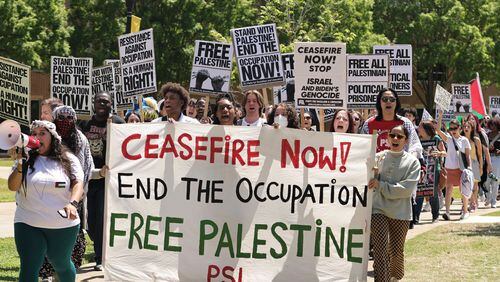A tribute to the Orlando victims
Across the U.S., Muslims mourned the loss of 49 people after a shooting at an Orlando gay nightclub.
Nauman Butt is hopeful that out of that tragedy might come a chance for dialogue and greater acceptance of LGBT Muslims.
Butt, 32, a business analyst from Atlanta, said he has lots of straight Muslim friends who complain about Islamophobia. “But when I ask about gay rights, they say, ‘No, we don’t accept it.’ They say if you are gay, you have a choice to do it.”
Butt, who is in a relationship, has not set foot in his native Pakistan in 15 years because he fears for his life as a gay man. His father won’t speak to him. He has a good relationship with his mother, but even that is sometimes strained because of his sexual orientation.
He’s been beaten and shunned, he said.
The disdain he feels from other Muslims has made him so uncomfortable that he no longer considers himself a practicing Muslim and no longer attends a mosque.
“I used to be a devout Muslim, but I just couldn’t handle the burden of being Muslim and gay. I felt that I was compromising my own identity being gay. … Every time I would go to mosque, they would talk about sin. It was a constant burden.”
Homosexuality is considered a sin by some people in Islam as well as some Christians. In fact, some evangelical Christians have refused to mourn the Orlando victims.
In many nations, including some areas of the U.S., it’s still not entirely safe for lesbian, gay, bisexual and transgender individuals.
Amnesty International calls anti-LGBT violence a “grave concern.”
Earlier this year, LGBT activists Xulhaz Mannan and Tonoy Mahbub were hacked to death by members of an Al-Qaeda affiliate. In Nigeria, there have been more than 200 cases of people being beaten and handed over to police for allegedly being LGBT.
And, in Iraq and Syria, the Islamic State group reportedly has killed dozens of men believed to be gay, bisexual or transgender. In some cases, they have been thrown off roofs of buildings.
Perhaps now that view will start to change among Muslims, said Kelly Wentworth, who is bisexual, converted to Islam in college, and is president of the Atlanta chapter of Muslims for Progressive Values.
“We’ve been making strides, but sometimes an unfortunate incident like this pushes the dialogue forward,” said Wentworth, 38, a software consultant and volunteer imam at Atlanta Unity Mosque. “Sometimes comfortably, sometimes not so much. It seems right now, today, conversations have started to move forward.”
Abdullahi Ahmed An-Na‘im, a law professor at Emory University and author of “What Is an American Muslim: Embracing the Faith and Citizenship,” is not so sure there will be a sea change in attitude.
“People tend to become conservative and defensive when they feel they are under siege and attack,” he said. “In my studies about Islamic reform, and as I observe Muslims when I travel around the world, I see more entrenchment and less opening up for new interpretations of Islamic scriptural sources and history.
“It also seems to me that Muslims around the world also resent the fact that they are suddenly expected to have a clear theological position on this question simply because Americans suddenly changed their mind over the last decade about this dimension of human sexuality,” he said.
One of the strongest statements in support of the LGBT community came from Nihad Awad, executive director of the Council on American-Islamlic Relations in Washington, the nation’s largest Muslim advocacy organization.
Awad called the mass shooting “a hate crime, plain and simple” and said the group stands “shoulder to shoulder” with the LGBT community.
"Homophobia, transphobia and Islamophobia are all interconnected systems of oppression, and we cannot dismantle one without dismantling the others," Awad said during a news conference with other Muslim leaders after the attack.
A 2011 survey by the Pew Research Center found that 39 percent of Muslim Americans surveyed said homosexuality should be accepted while 45 percent said it should be discouraged. However, an earlier survey in 2007 found 27 percent said it should be accepted and 61 percent said it should be discouraged, so views are changing.
“The Jewish, Christian and Islamic faiths share similar views about family values and personal morality,” said CAIR Georgia Executive Director Edward Ahmed Mitchell. “But people of faith also know that we cannot impose those views on our neighbors. Every American has the right to live his or her private life in dignity, without fear of injustice or violence.”
About the Author






